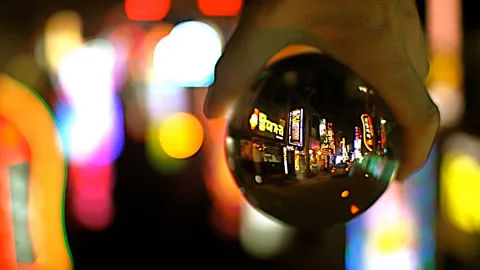Could you be a super-forecaster?
 Getty Images
Getty ImagesTake part in a prediction challenge that could shine a light on skills you never knew you had.
The world in 2019 can seem pretty uncertain. When there are unprecedented events in every other news cycle, it can feel difficult to see where we might be headed.
But there are some people who are particularly good at seeing what is around the corner: “super-forecasters” can predict the likelihood of future events with astonishing accuracy, often with no particular prior expertise.
So, could you be a super-forecaster? You could find out by taking part in a new challenge we’re running this year.
- the You Predict The Future challenge [Update: The challenge is now closed.]
BBC Future is collaborating with Nesta – the UK innovation foundation – to investigate how individuals and teams forecast global events, from technological and scientific changes to geopolitical events, and much more. The challenge is hosted by Good Judgment, a forecasting services organisation inspired by evidence-based research about prediction.
Participating is simple: after g up, you will be given statements about the future that have multiple outcomes, and then asked to assign a percentage to how likely they are to come true.
So, for example, one of the questions is:
Before 1 January 2020, will either SpaceX or Boeing launch its first crewed space mission?
No
Yes, only SpaceX
Yes, only Boeing
Yes, both Space X and Boeing
What do you think? Perhaps you already know a bit about this subject, or perhaps you need to do a bit of research: no expertise is needed to take part. Throughout the coming months, we’ll add more predictions covering a wide array of topics, everything from politics to weather to culture.
Not only is this challenge a fun way of engaging with the world around you, it’s likely to also improve your forecasting in general. “When you’re part of the challenge, you’ll get on how accurate your forecasts are. You’ll be able to see how well you do compared to other forecasters. And there’s a leader board, which shows who the best performing forecasters are,” says Kathy Peach, who leads Nesta’s Centre for Collective Intelligence Design.
It's also possible there are a few unexpected upsides to taking part. “New research shows that forecasting increases open-mindedness, the ability to consider alternative scenarios and reduces political polarisation,” adds Peach.
So, what are you waiting for? Sign up for the You Predict The Future challenge now, and hone those forecasting skills. [Update: The challenge is now closed.]
--
Note: The survey is run by Good Judgment and they will be responsible for any personal data you provide. Read the site's .
Amy Charles is BBC Future’s social media producer. She is @amycharles on Twitter.
